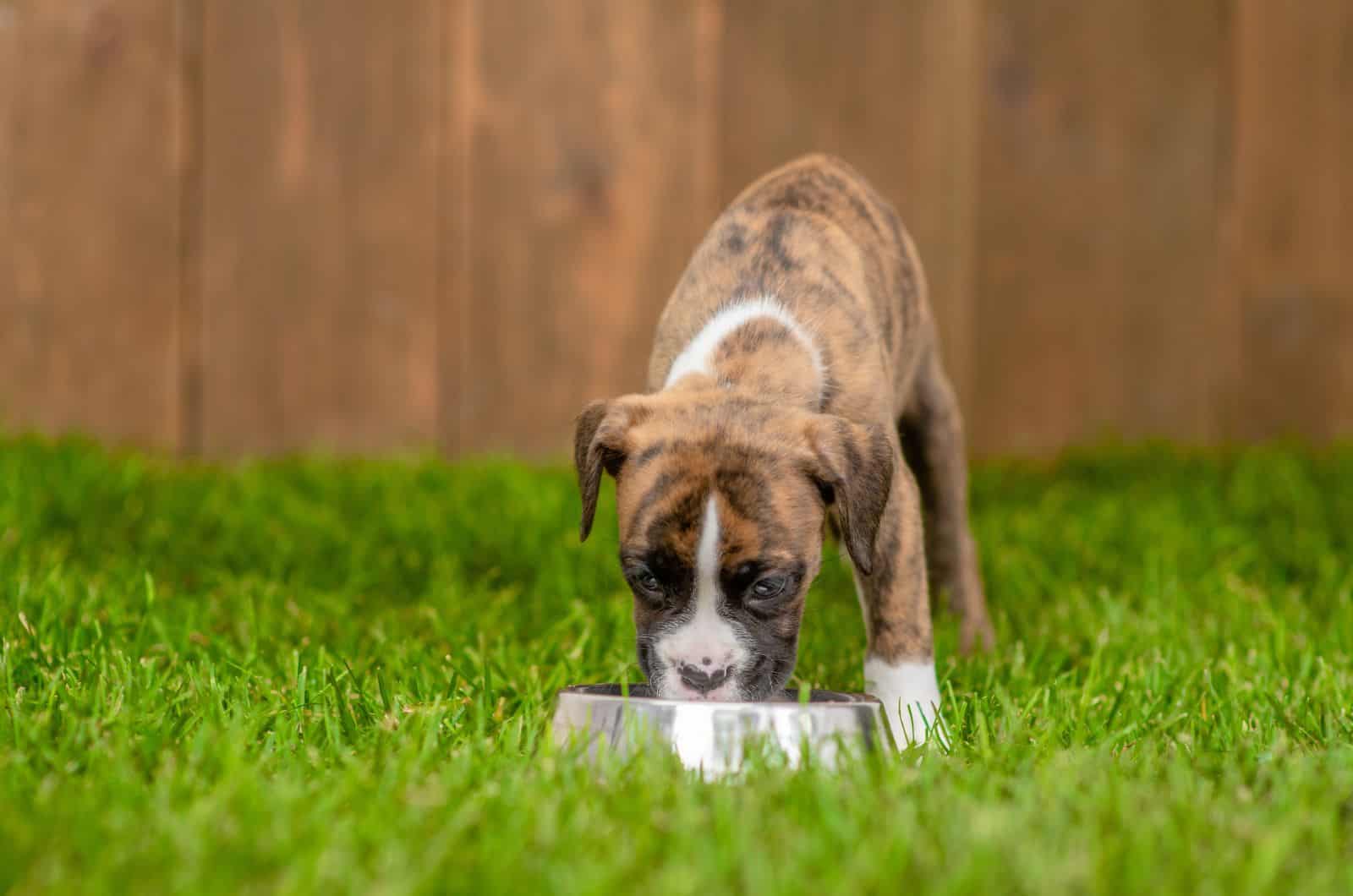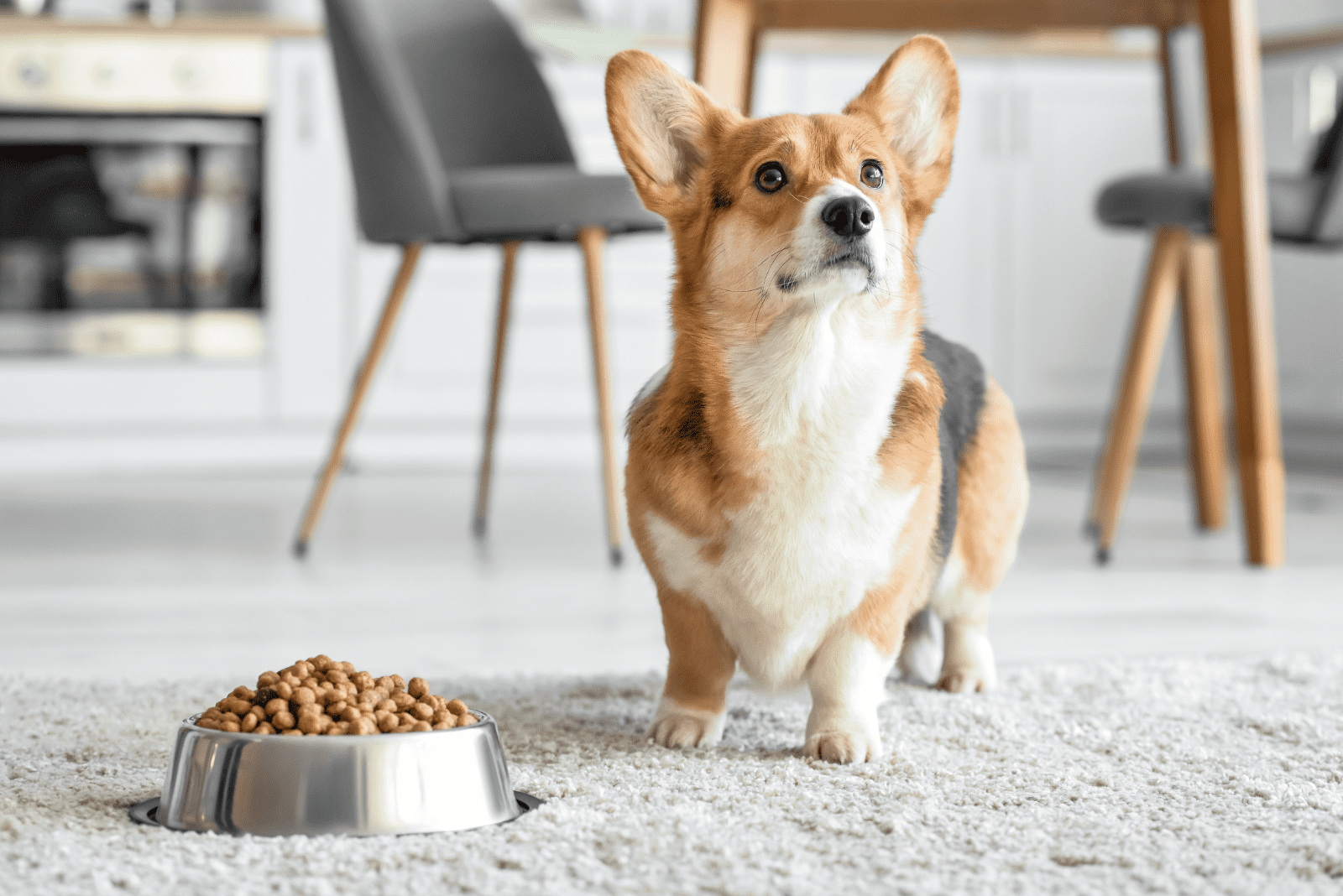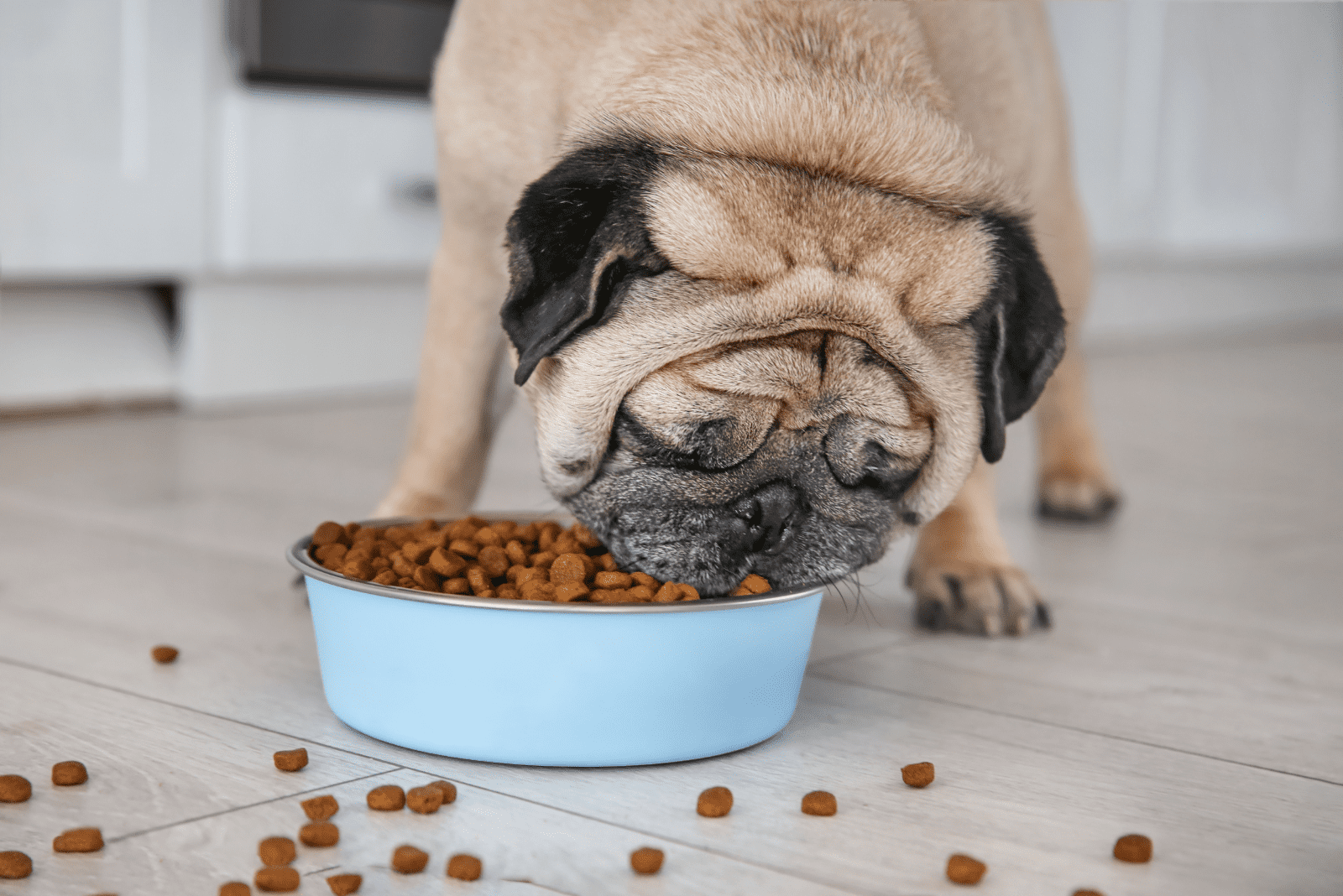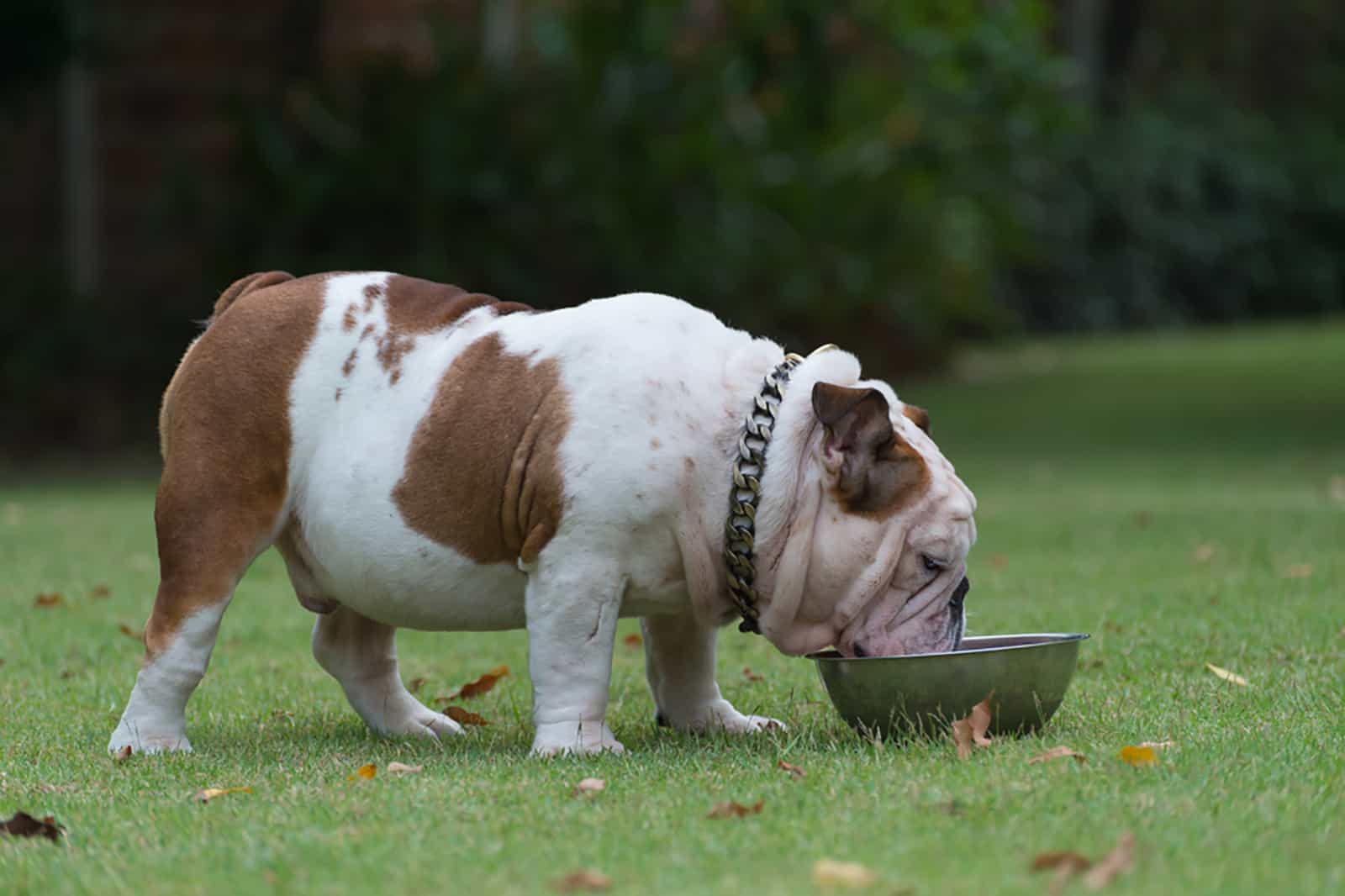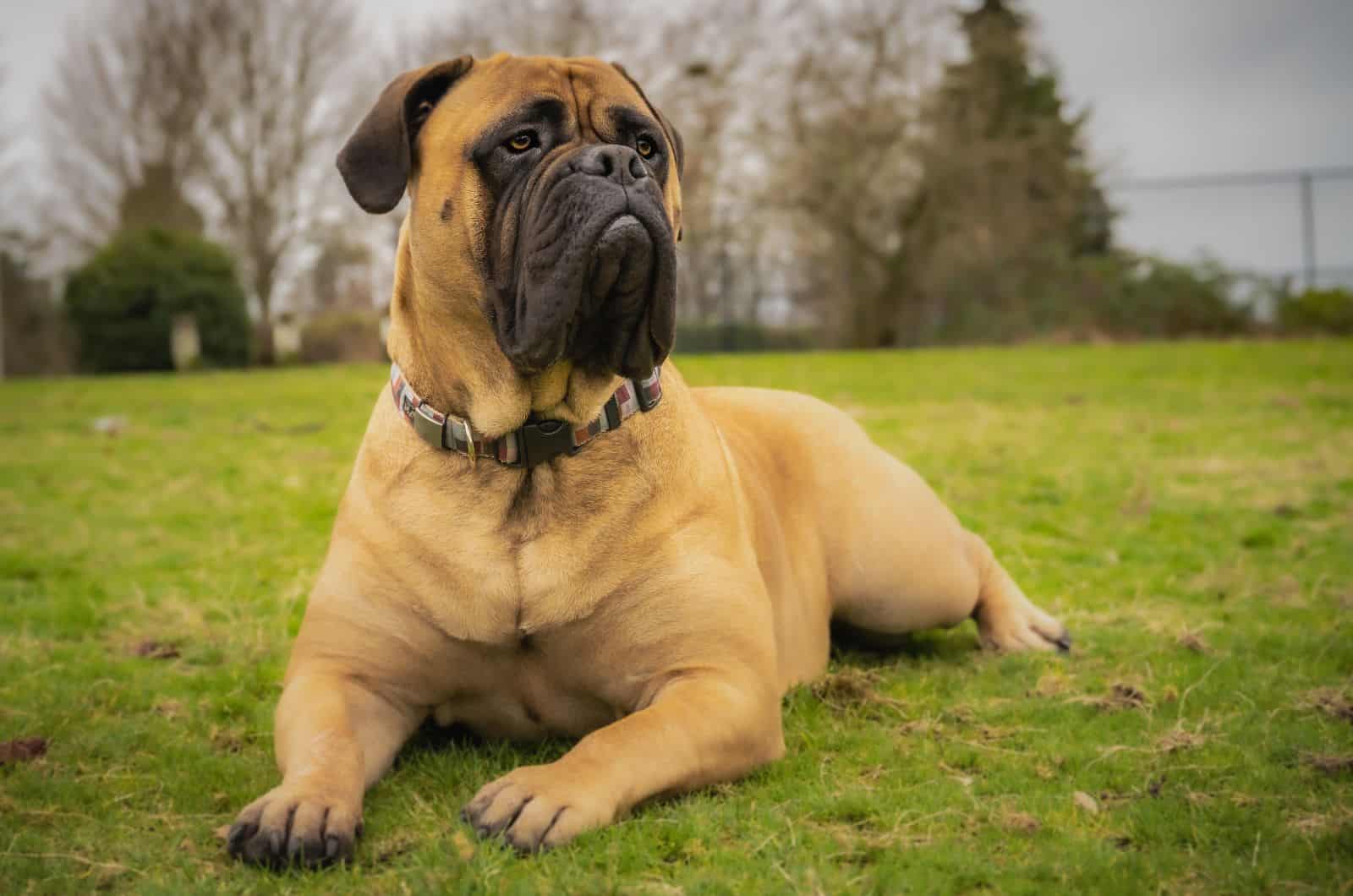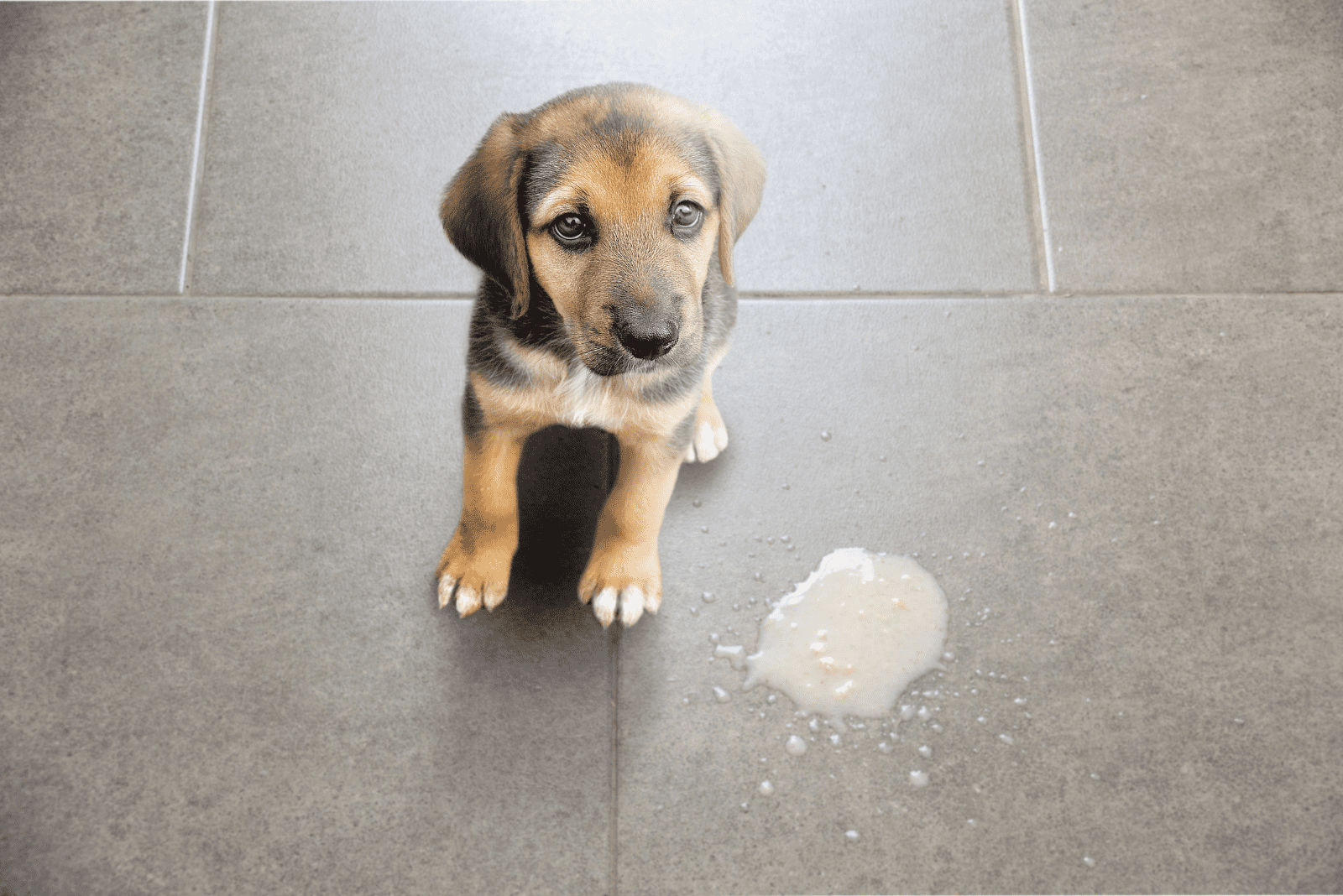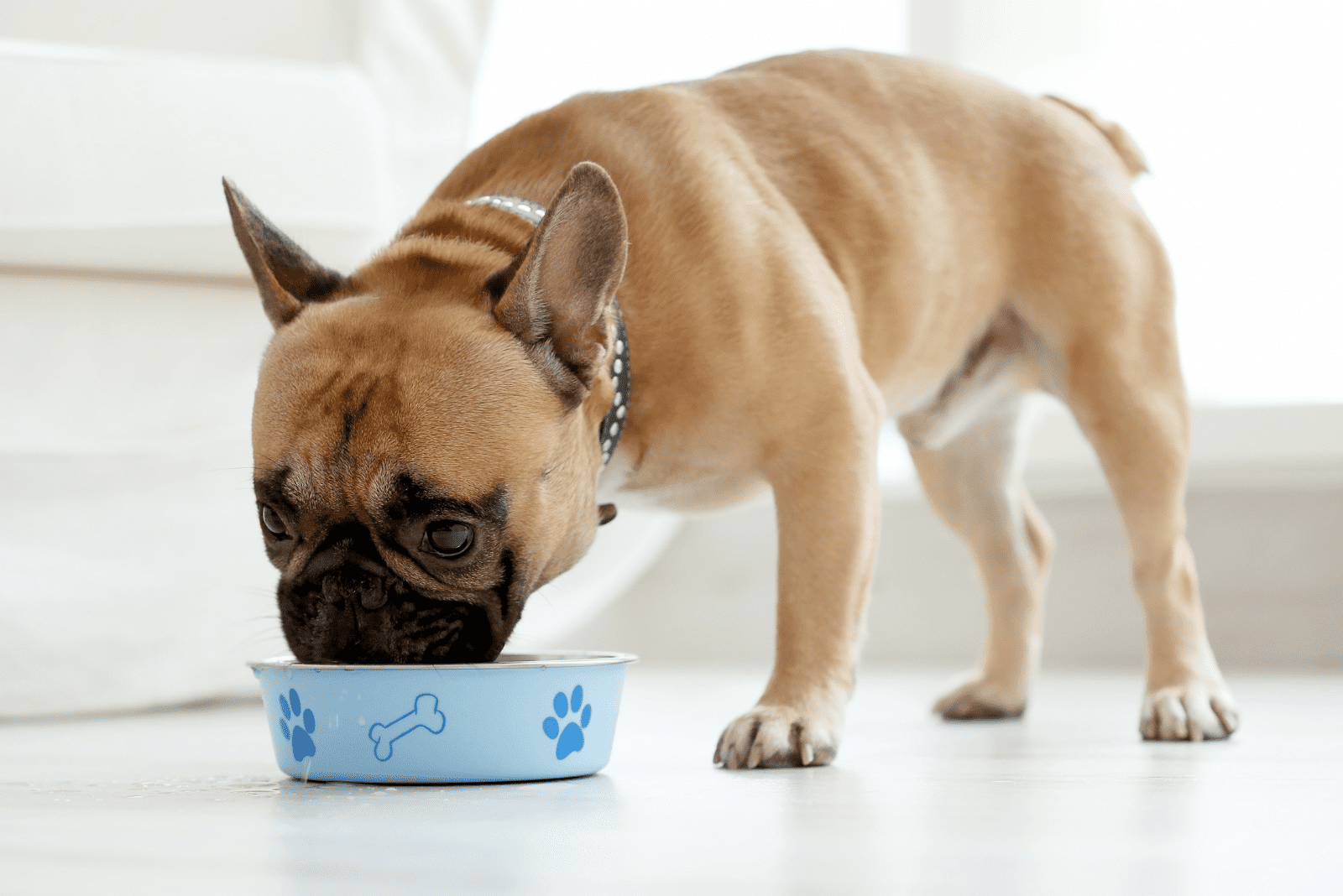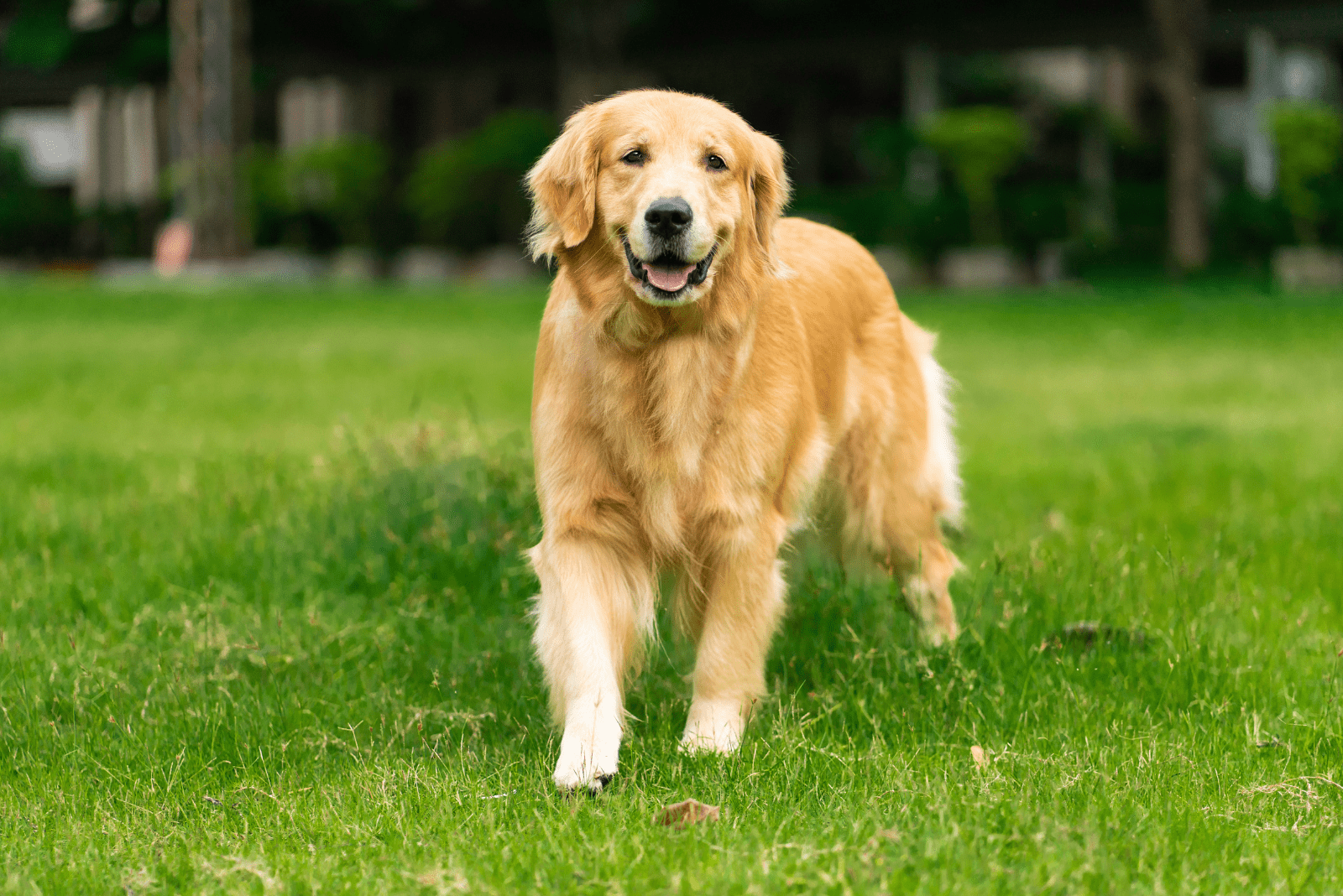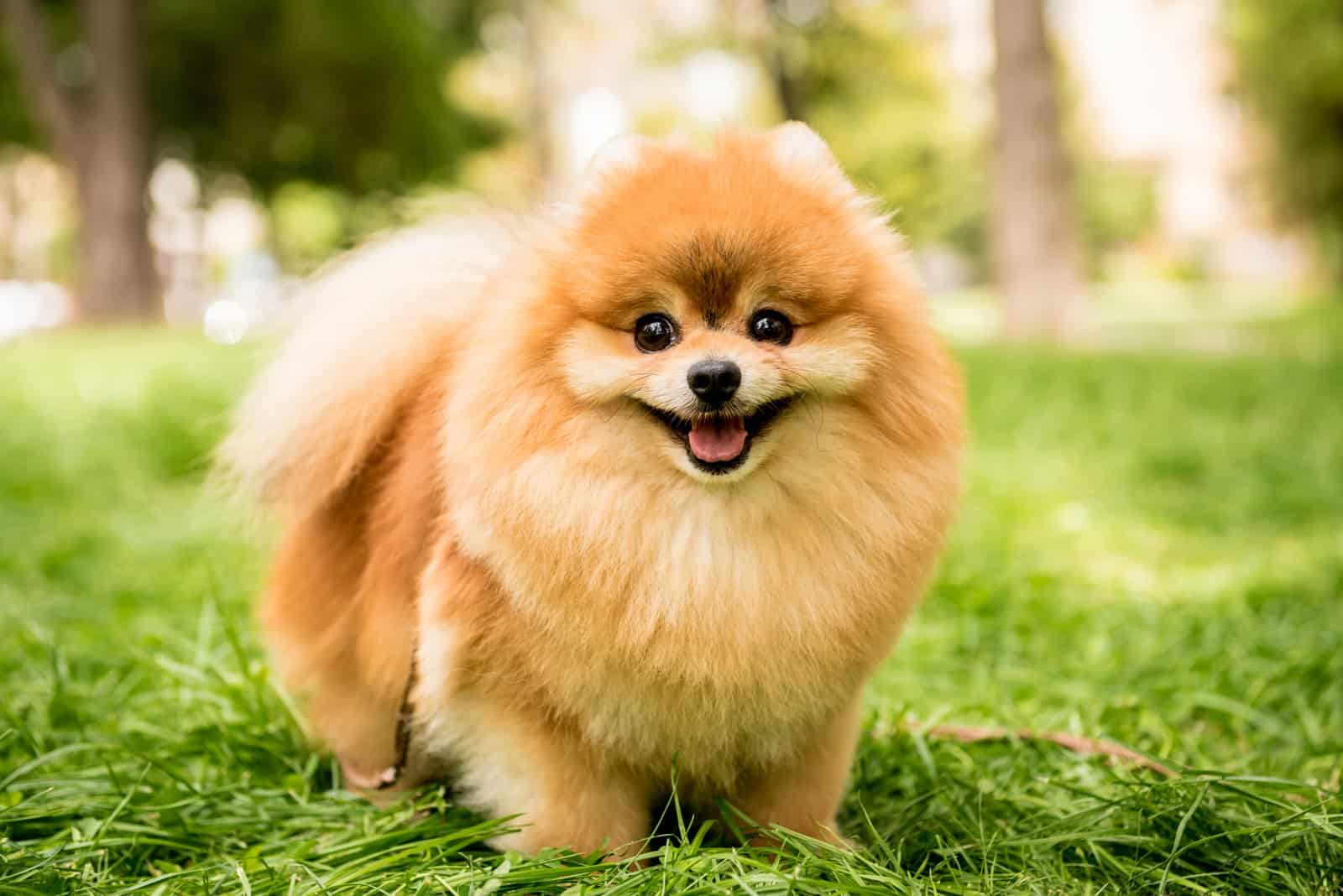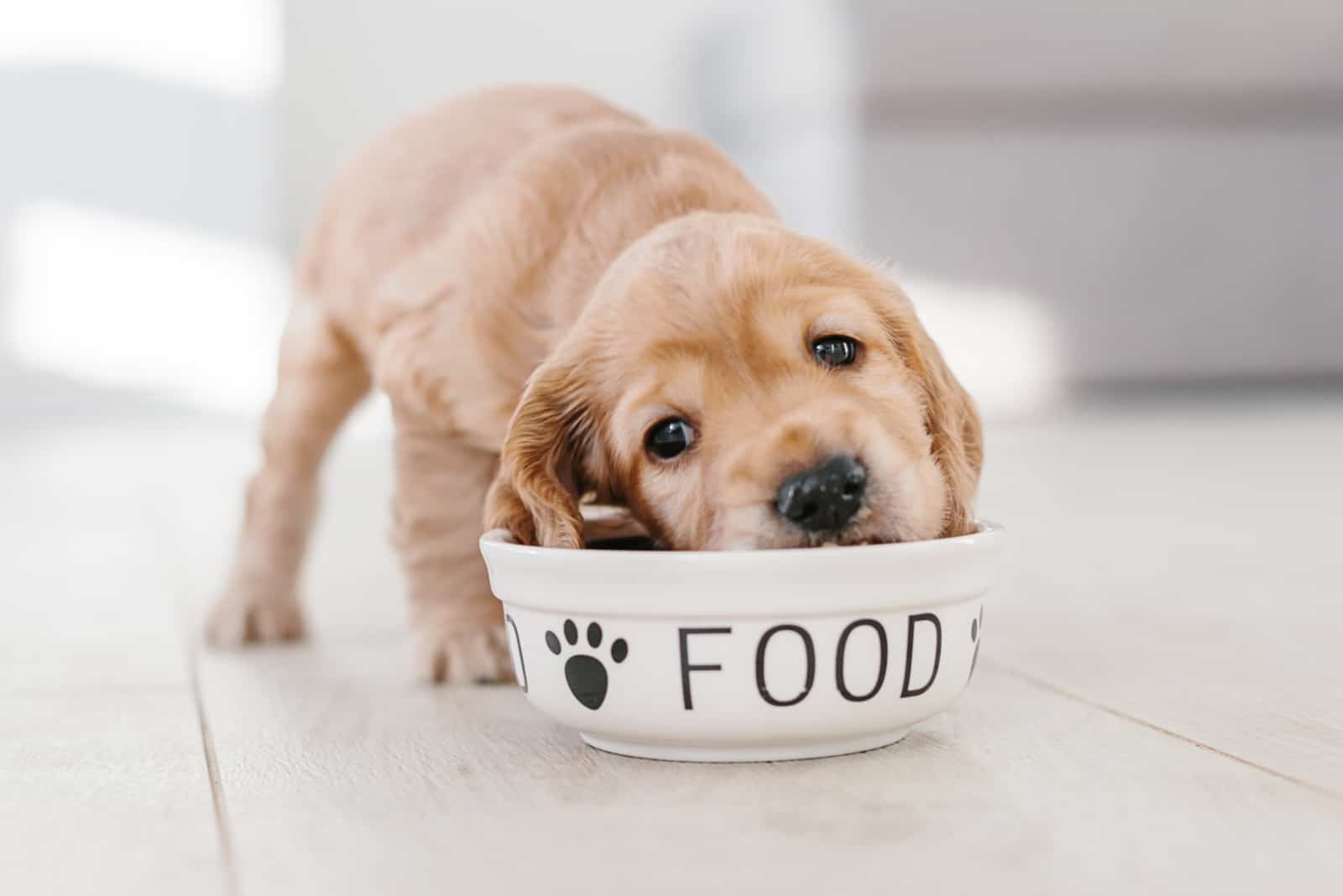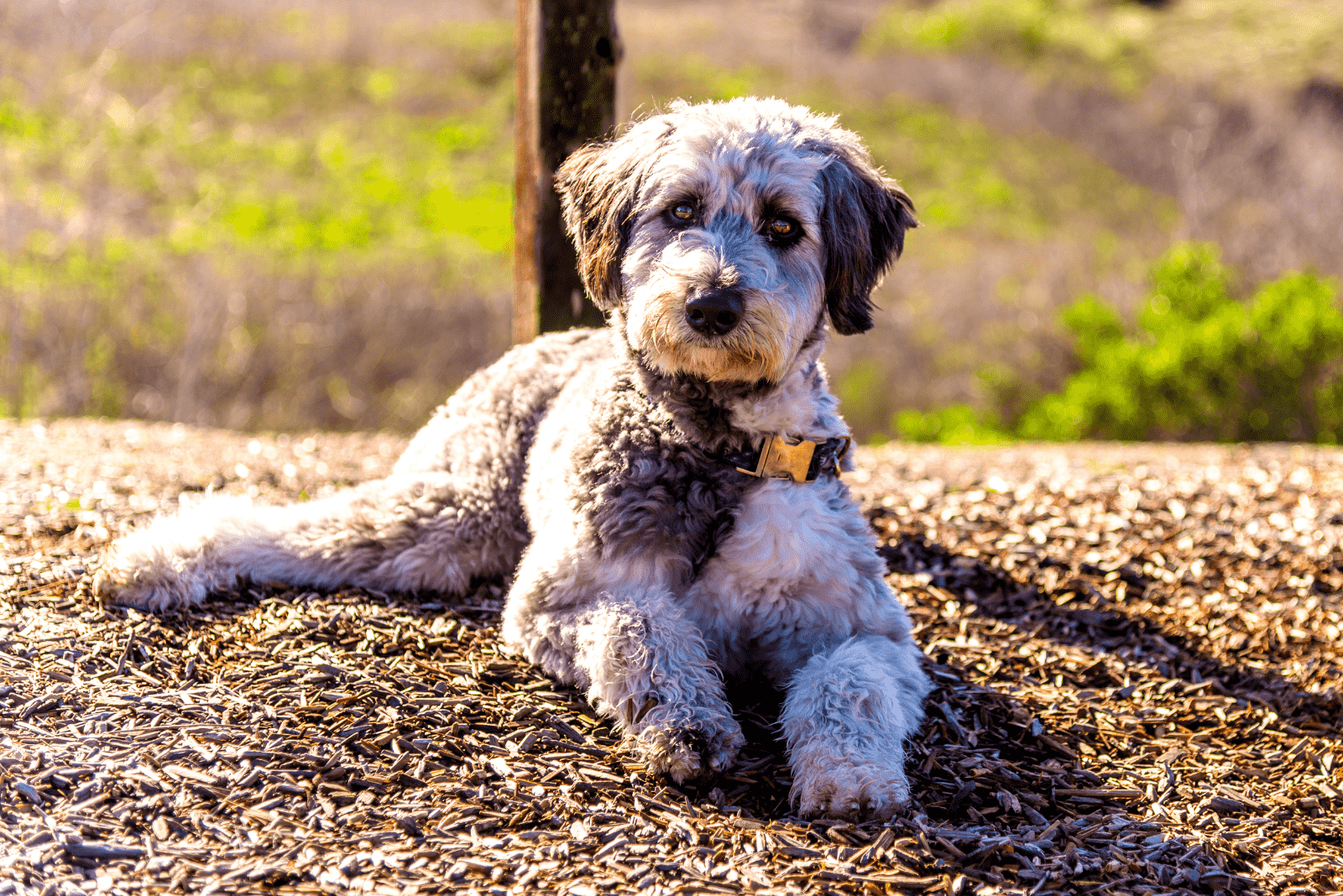Doberman Pinschers are known as some of the most amazing dogs out there. They are intelligent, powerful, and undyingly loyal dogs that make impressive guard dogs, but also wonderful family members.
It shouldn’t come as a surprise to anyone that lots of people are looking to buy Dobie puppies – in fact, they are considered among the few dog breeds whose popularity never seems to decrease.
If you’re one of the people looking to buy a new Dobie puppy, or you’ve already committed to one and you want to know everything there is to know about being a good dog owner, and how to properly feed your new pup – a Doberman feeding chart is a useful tool to help you understand your new pup’s feeding requirements.
All puppies need a balanced diet and a healthy amount of exercise in order to develop properly and flourish into healthy and strong adult dogs.
That said, whether you’ve got an eight-week-old puppy or a young-adult Doberman Pinscher that’s already at the two-year mark – we’ve got you covered with our Doberman feeding chart and some useful advice on how and when to feed your Dobie for optimal results.
So, let’s get started, shall we?
Doberman Puppy Feeding Chart
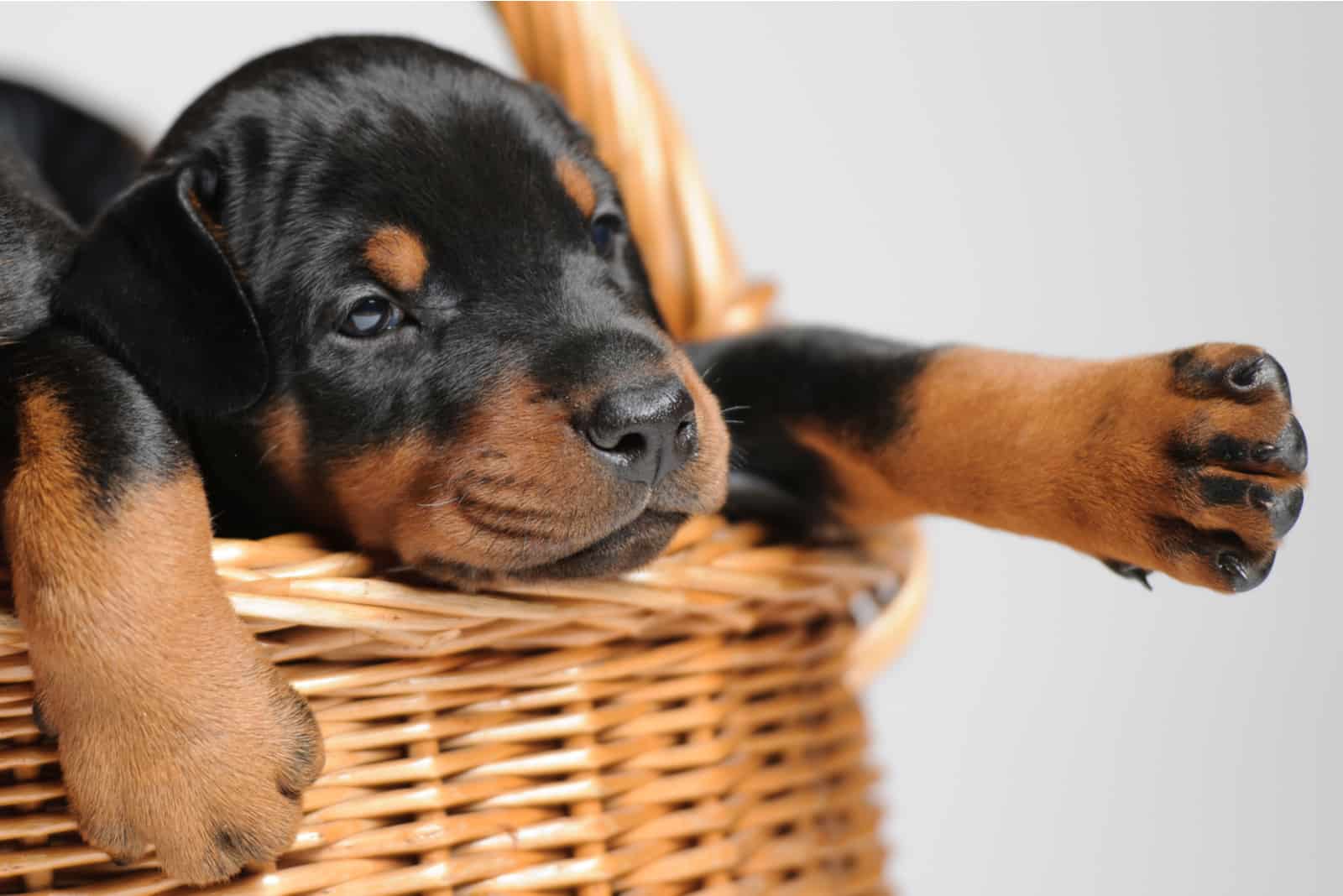
Before we dive deep into the heart of the matter, here’s a quick look at the Doberman puppy feeding chart.
Since there are always differences between two genders of the same breed, we’ve also listed the separate feeding requirements for both male and female Dobermans.
| Age | Cups of Dry Kibble Daily | Calories |
|---|---|---|
| 2-3 months old | Males: 1 to 3 Females: 1 to 2.5 |
Males: 420 – 1250 Females: 420 – 1050 |
| 4-5 months old | Males: 3 to 6 Females: 2.5 to 5 |
Males: 1250 – 2500 Females: 1050 – 2080 |
| 6-8 months old | Males: 4 to 6.5 Females: 3 to 6 |
Males: 1680 – 2720 Females: 1250 – 2500 |
| 9-11 months old | Males: 4 to 7 Females: 3 to 6.5 |
Males: 1680 – 2920 Females: 1250 – 2710 |
| 1-2 years old | Males: 4.5 to 8 Females: 4 to 7 |
Males: 1880 – 3340
Females: 1670 – 2920 |
| 3-6 years old | Males: 4 to 7 Females: 3 to 6.5 |
Males: 1590 – 2770 Females: 1190 – 2570 |
| 7 years and older | Males: 3 to 6 Females: 2.5 to 5 |
Males: 1130 – 2250 Females: 940 – 1870 |
It’s worth noting that there are several different things you need to take into consideration, and we’ll talk more about these later on.
You should keep in mind that this Doberman feeding chart is meant to serve as a general rule of thumb – a guide, if you will.
Don’t be stressed out or concerned if you’ve been feeding your pup more or less food compared to the feeding chart because every individual puppy grows at its own pace and the servings you feed it can always be managed accordingly.
Most experienced Doberman owners say that Dobermans need a significant amount of calories that is more than is recommended by most pet food manufacturers.
How Often Should I Feed My Doberman?
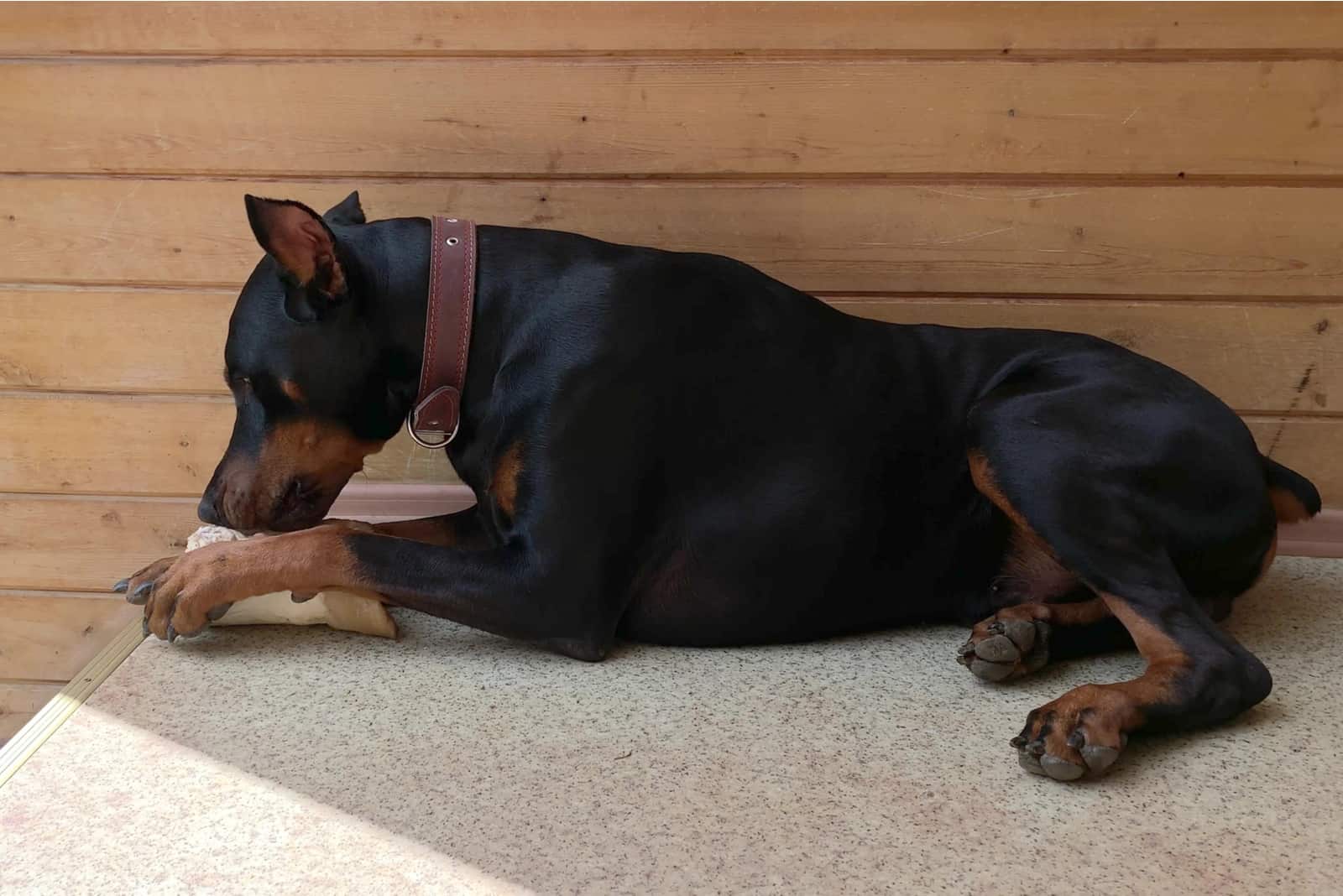
As a responsible Doberman owner, you should use the information listed above in the Doberman feeding chart, combined with a veterinarian’s opinion, in order to come up with a plan of how much to feed your Doberman Pinscher daily.
After you’ve come up with a plan of how much food you should give your pup, you should determine exactly how many times you’ll be feeding your dog each day.
Doberman puppies from six to twelve weeks of age should be fed four meals per day, Doberman pups from twelve weeks to a year should be fed three meals per day, and adult Dobermans over the age of one should be fed two meals per day.
Here’s a quick look at the number of meals that both female Doberman puppies and male Doberman puppies should eat per day on average in accordance with their age, and this is represented in chart form.
| Age | Number Of Meals Per Day |
|---|---|
| 6 to 12 weeks of age | four meals per day |
| 12 weeks to 1 year of age | three meals per day |
| 1 to 7 years of age | two meals per day |
| 7 years and older | two meals per day |
Dobermans are dogs that function best when they have a daily routine – ideally, you should feed your Doberman at the same intervals each day. This approach helps young puppies to get used to their new environment and feel more comfortable in their new home while reducing anxiety around feeding time.
That said, you should take caution when feeding your Doberman puppy. Like all other dog breeds, Doberman puppies can hardly control themselves when they’re around food.
Overeating
It’s safe to say that if you leave your pup unattended near an open bag of dog food – it’ll probably end up eating all of it until it feels sick.
This is due to the fact that dogs are opportunistic eaters – their ancestors were used to eating sporadically when they managed to catch prey, so they tended to use any opportunity they could and eat as much as they could in order to be able to survive as long as possible.
Because of this engraved instinct, all puppies are prone to overeating, and they can easily become overweight if they’re not supervised.
Even though we’ve provided you with the average amount of Doberman food you should feed your pup, it should still serve as a general guide as opposed to a specific thing to follow.
You should take into consideration your puppy’s growth, weight, hunger, and the type of dog food it eats.
It’s also worth noting that most dogs don’t need the same amount of dry kibble as opposed to wet food.
How Much Food Should I Feed My Doberman?
Okay, we’ve given you a quick look at the Doberman feeding chart that you can follow in order to know how much to feed your new Dobie pup, but now it’s time for a more in-depth look – just to make everything clearer.
Here’s how much you should feed a Doberman Pinscher puppy with respect to its age.
Two-Week-Old Doberman Puppy – Neonatal Period
When puppies are born, they don’t yet have the ability to eat dog food – they’re completely dependent on their mother, and the only food they consume is their mother’s milk, which has all the nutrients that are necessary for their survival.
During the neonatal period, puppies will open their eyes for the first time, but they still won’t wander far away from their mother because they depend on her for warmth, safety, and nourishment.
Unless you see a specific reason to interfere, such as an individual puppy that’s not feeding properly, it’s best not to do so. At this stage, puppies and their mothers instinctively know how much food they need to consume.
If you’re a dog breeder, you need to make sure to monitor all the puppies in order to ensure that each pup is getting its fair share of its mother’s milk. You should only interfere if you notice a runt of the litter that’s not growing enough – in that case, make sure to purchase a dog formula that will help increase a newborn Doberman puppy’s weight.
It’s also a good idea to consult with a veterinarian if you suspect that something else is wrong with one of the pups in the litter.
Three-Week-Old Doberman Puppy
Once your Dobie puppy reaches the three-week mark, it’ll become a bit more active than before, but it’ll still spend most of its time snuggling up with its mother.
Needless to say, this still isn’t the right time to make the switch to puppy food, let alone adult dog food.
Three-week-old Doberman puppies still need to feed on their mother’s milk, and they should instinctively do so when they feel the need for nourishment. Of course, you can use dog formula in case a puppy is not feeding properly or if the mother refuses to nurse a pup.
Four-Week-Old Doberman Puppy
At the time of around four weeks old, puppies should begin to explore the world around them.
At this stage, the puppy’s main nutritional intake should still come from its mother’s milk, although it might be a good time to try to gradually introduce it to its first puppy food.
You should start the process by giving your Dobie pup very small amounts of puppy food in order to test if it’s interested in eating it – make sure not to force it to eat the puppy food, but rather, only bring its head close to it and see what happens.
One thing that you need to keep in mind is that a puppy this young still doesn’t have a properly developed digestive system – you should make sure to keep a ratio of one-quarter puppy food to three-quarters water in order for the puppy to be able to easily digest.
Five-Week-Old Doberman Puppy
At the five-week mark, your Doberman puppy should begin to be more interested in the puppy food and water mix – even if it wasn’t that into it before, it’ll most likely want to try it now.
It’s still crucial to maintain a mixture of a quarter of puppy food and three-quarters of water because the puppy’s stomach is still fairly small – it still needs to have its mother’s milk while gradually making the transition toward puppy food.
It’s important not to try to force it to eat – its mother will guide it toward gradually weaning off of breast milk if it doesn’t feel ready just yet.
Six-Week-Old Doberman Puppy
At this time, a puppy should gradually stop having its mother’s milk entirely and begin consuming puppy food as its main nutrient source.
It’ll also gain more confidence and begin to explore more of its environment – therefore, it’ll require more energy, which the mother’s milk simply cannot provide.
The most reasonable way to make the transition is to slowly increase the quantity of puppy food with the same amount of water while gradually adding more and more food to the mix.
After your puppy is used to eating the one-quarter puppy food to three-quarters water mix, you can increase the amount of food and make a fifty-fifty mix.
The next step is to monitor whether your dog can handle the fifty-fifty mix – if you determine that it’s safe to take it a step further, you can start feeding it a mix of ninety percent puppy food with ten percent water in it.
Seven-Week-Old Doberman Puppy
At the seven-week mark, your Dobie should be able to eat dry dog food for puppies without any water added to the mix – in fact, your Dobie should begin to enjoy its food more and more.
A seven-week-old Doberman puppy should exhibit a healthy appetite that will continue to grow.
Because of this suddenly developed voracious appetite, it’s important not to overfeed your Dobie – make sure to give it a small amount of kibble spread out over four to five meals per day.
However, seven-week-old puppies still need nourishment from their mothers from time to time – the only difference is that now, the mother will feed her puppies while standing as opposed to lying down.
This is the last stage where a puppy still needs to feed on its mother’s milk, and the mother will likely not let her puppies leech as much as they would like to. It’s also worth noting that puppy teeth start developing at around this time, so it will likely be unpleasant for the mother to keep on feeding her pups.
Eight- to Nine-Week-Old Doberman Puppy
During this stage, your Doberman puppy should completely switch to eating puppy food, and no longer be reliant on its mother for
nourishment – giving her a chance to finally get some well-deserved R&R.
This is also the time when most responsible breeders will allow their puppies to be adopted since they no longer need their mother. At this
time, it’s the new owner’s responsibility to take the reins and control how much their dog eats, and when it eats.
It’s important to establish a strict feeding schedule from the moment you bring your new Dobie to its new home. You should feed your Dobie at least four times per day, and make sure that its mealtimes are consistently at the same time.
The amount of kibble you should feed your Doberman puppy is around 1.5 cups per portion. Make sure not to overfeed it, but also not to force it to eat it all if it doesn’t want to.
It’s always best to feed your pup several smaller meals throughout the day rather than one large serving – this helps your pup’s digestive system develop adequately.
Since your pup will be eating lots of dry dog food, it’s crucial to also provide it with plenty of water in order to help it digest the food properly.
Ten-Week-Old Doberman Puppy
At the ten-week mark, your Doberman puppy’s activity levels and energy levels will likely be through the roof – that’s why it’s important to maintain its feeding schedule of four meals per day, while slowly adding half a cup of food per serving.
This is also the time when your Doberman puppy will likely hit its first real growth spurt, so it’s best to closely monitor its weight.
While overeating can lead to obesity in any dog breed of any age category, it’s especially true for large-breed puppies like the Doberman Pinscher.
If a dog is overweight at such a young age, its bones will likely be under a lot of pressure, which will increase the chances of it developing certain health conditions.
Make sure to closely monitor your Doberman puppy’s food intake, and keep an eye on its stomach in order to make sure it’s not bloated.
The best way to monitor your Doberman puppy’s developmental progress is to use a Doberman growth chart – a useful tool that will help you determine whether or not your pup is of a healthy dog weight and if it’s hitting all of its developmental milestones.
Also, you can find useful information in our article on how heavy a dog should be.
Eleven-to-Twelve Week Old Doberman Puppy
This is the period where your Doberman puppy is right in the middle of its first growth spurt and its appetite will likely be enormous. You should increase your pup’s daily amount of food by at least half a cup per serving in order to keep up with its newfound appetite.
It’s also important to note that during this period, your Dobie will likely try to nibble on anything it can get its paws on since this is around the time when it begins teething.
Make sure not to leave your Dobie pup unsupervised since it can potentially ingest something inedible that will most likely cause health issues.
It’s also normal for your pup to have days where it eats lesser amounts of food than it does normally – there’s no need to be alarmed if this is the case since your Doberman puppy is still getting used to its new body.
Three-to-Six Month Old Doberman Puppy
The period between three and six months of age is when your Doberman puppy will grow the most.
Due to its high energy levels, your Dobie will need to eat more, but it will also love to eat more than it should. Make sure not to let yourself be fooled by the puppy dog eyes, and keep feeding your Dobie strictly according to the Doberman feeding chart listed above.
Also, make sure to keep anything and everything that isn’t dog food out of your pup’s reach, especially things that can cause bloating (also known as gastric dilatation-volvulus).
While this condition is rarely seen in young dogs, it’s best not to take any chances with your dog’s health.
Six-to-Twelve Month Old Doberman Puppy
By this time, it’s safe to begin feeding your Doberman up to six cups of dog food per day, spread out over just three meals per day instead of four.
Your Doberman’s growth rate should begin to slow down at this point, but it’ll still continue growing bigger gradually.
The one-year mark is the time when you should begin switching your pup’s diet from puppy food to adult dog food.
The best way to accomplish this is to gradually mix in small amounts of adult dog food with puppy food, and continue the process by adding more and more adult dog food.
It’s worth mentioning that it’s a process that shouldn’t be rushed. Some Doberman Pinschers won’t be ready to eat adult dog food until they reach two years of age – this is also true for other breeds, such as the German Shepherd.
How Long Should You Feed A Doberman Puppy Food?

A general rule of thumb to keep in mind is that every dog should be fed puppy food until it stops growing. This, of course, varies depending on the dog breed since most small dogs will stop growing at around one year of age.
As far as Dobermans are concerned, the average time when a Dobie is ready to make the transition to adult dog food is between the one- and two-year mark.
Keep in mind that if you make the switch from puppy food to adult dog food prematurely, you’ll change your Dobie’s nutrient intake too soon.
This could cause your Doberman to not get enough of the proteins and minerals that are necessary for its proper development, which could lead to permanent joint damage.
If you’re not sure whether your Doberman has stopped growing, it’s best to consult a veterinarian for a professional opinion.
Doberman Puppy Food Nutritional Value
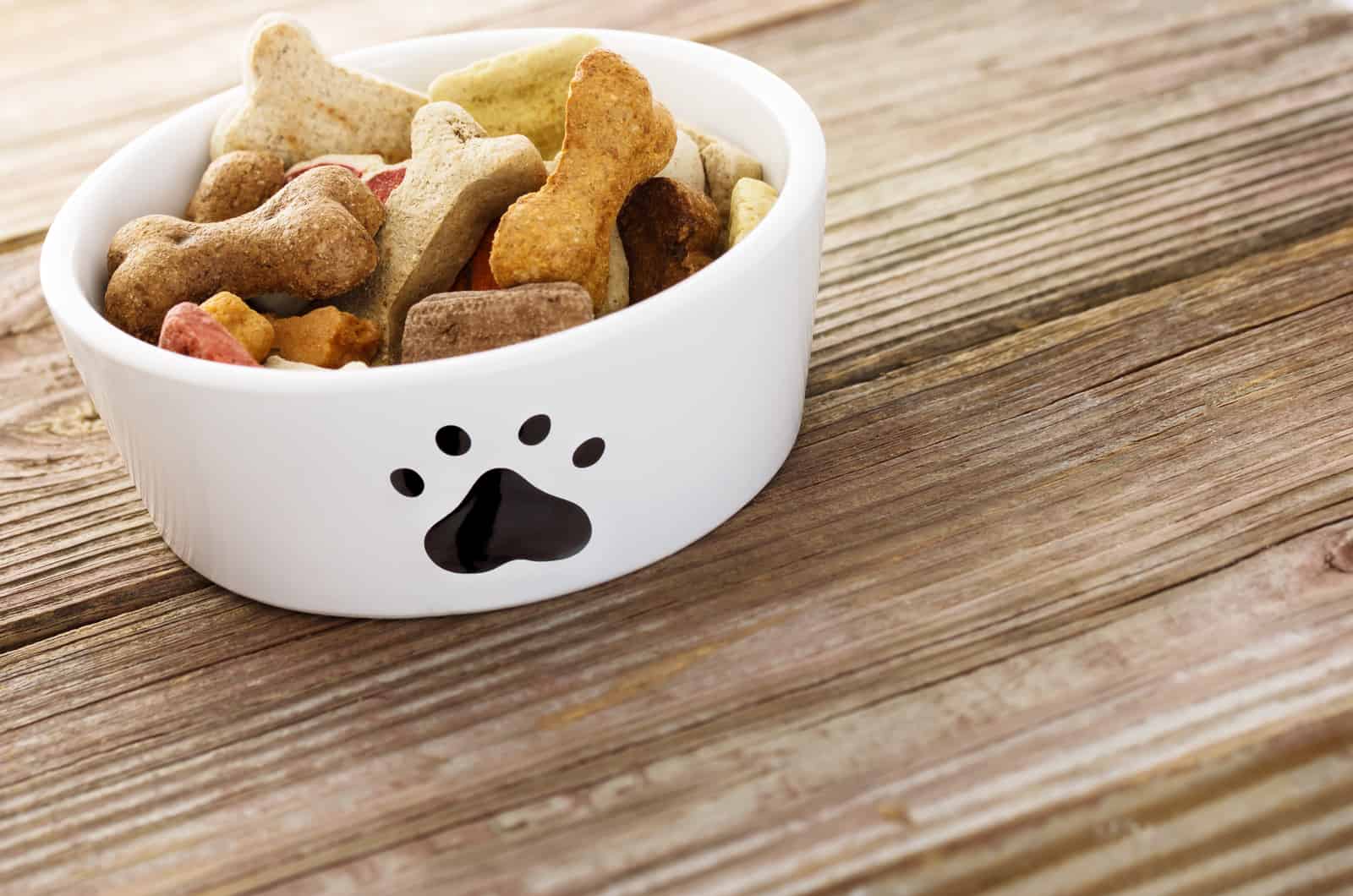
Apart from the amount of food you’re feeding your Doberman, and its feeding schedule, another crucial factor to keep in mind is the type of food you’re feeding it.
Young Doberman puppies have different nutritional requirements compared to adult Dobermans and senior Dobermans due to their developing body – so they should naturally be fed different foods.
Protein
Unlike we humans who mostly need sugar and carbs for energy, dogs need lots of protein in order to develop properly, especially when they’re still growing. The first ingredient that should be listed on a quality dog food package should be protein.
You should feed your growing Doberman quality food that contains a minimum amount of 22% protein.
It’s best to find high-quality protein sources such as beef, fish, and chicken – it’s also best to avoid any meat by-products since they usually contain lots of other stuff that isn’t as healthy as real meat, such as intestines, bones, and brains.
Fat
Another thing to keep in mind is your puppy’s fat intake – the average amount of fat in your dog’s food should be around five percent. In addition to fat, a dog’s diet needs to contain lots of healthy fatty acids, such as omega 3 and omega 6 fatty acids.
Carbs
A Doberman puppy also needs to consume between five and eight percent of carbs in its diet – but it’s important to be careful with just how much carbs it eats. Most dogs, if not all, are especially sensitive to whole grains, which should be avoided.
Even though they’re a great energy source for humans, whole grains can often make a dog’s stomach bloat – which is why you don’t want to go overboard with them.
Make sure to try to find a dog food that is grain-free – these dog foods are usually made up of potatoes and peas as good sources of healthy carbs.
Gluten
Just like humans, it’s worth noting that some dogs can be intolerant to gluten – so it’s always a good idea to opt for gluten-free dog food if you observe that your dog often has diarrhea after consuming gluten.
While gluten itself isn’t necessarily harmful to a dog, if a certain dog is sensitive to it, it’s best to avoid it since it could cause developmental issues and damage their bowel wellness.
Lactose
It’s also important to know that most dog breeds are lactose-intolerant – however, most high-quality dog food manufacturers do not put lactose in their products.
Other than the mother’s milk that puppies consume when they’re young, it’s best not to give them any additional dairy products such as cheese, milk, or yogurt since they can cause digestive problems.
Other than these general guidelines, you should look for quality dog foods that are rich in antioxidants, minerals, vitamins, probiotics, water, and omega fatty acids – these will all ensure that your Doberman puppy develops a strong immune system and grows up to be healthy.
If you need a helping hand in choosing a quality dog food for your Doberman that’s not just the most popular Purina Pro Plan dog food – check out our article about the 15 best dog foods for the Doberman breed.
Doberman Puppy Raw Diet Guide
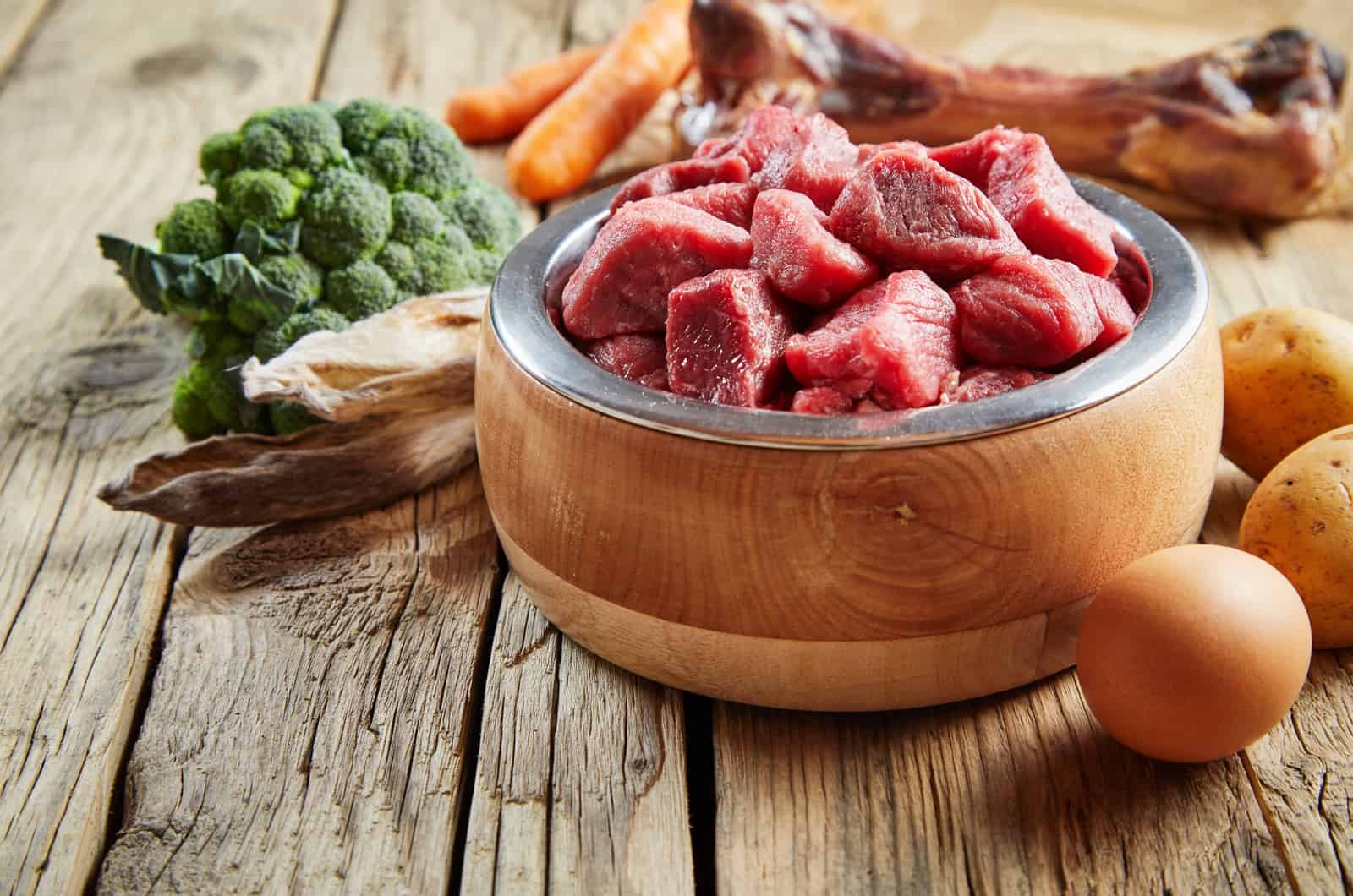
In the last decade, switching a dog’s diet to raw food has almost become the norm for every dog owner. A raw-food diet means that your Doberman is always eating fresh, raw foods that don’t contain any artificial coloring, preservatives, or fillers.
What this also means is that your Doberman won’t be consuming processed food or kibble, but will be eating food that you prepare yourself, or food from certain brands that focus on producing raw dog food.
Many dog owners prefer a raw-food diet because raw food is easier to digest and it contains fewer carbohydrates, as well as the fact that it significantly lowers the chance of a dog developing inflammatory bowel disease.
That said, it’s important to know that a raw-food diet is not without its faults.
Uncooked, raw food, such as raw meat, can contain bacteria and parasites that can cause severe debilitating illnesses, many of which can be life-threatening to your dog.
It’s okay to give your pup raw veggies and fruits (we’ll go over which ones are safe for dogs to eat in a minute), but if you still want to raise your Doberman on a completely raw-food diet, make sure that the meat you give it is at least properly cooked in order to avoid bacterial and parasitic infestation.
Since the safest meat for dogs to consume is chicken, it’s best to do some research on how to boil chicken for dogs, so that you can properly prepare your pup’s raw-food diet and avoid the problems that could occur with uncooked meat.
It’s always best to consult a veterinarian before you decide to start feeding your Doberman a raw-food diet.
How Much Water Should My Doberman Drink?
As far as water intake is concerned, you should make sure that your Doberman puppy always has access to clean drinking water – it will naturally drink enough water to sustain itself when it feels thirsty.
Of course, your Doberman will likely drink more water on hot days, especially after exercise.
As for the amount of water that you should give it – half a cup of water every two hours is more than enough to maintain a healthy hydration level.
However, one thing to keep in mind is that if you observe that your Doberman is not drinking enough water or drinking excessive amounts of water – you should consult a veterinarian to determine whether or not this could be a sign that something is wrong.
What Are The Health Issues That Can Appear From An Improper Diet
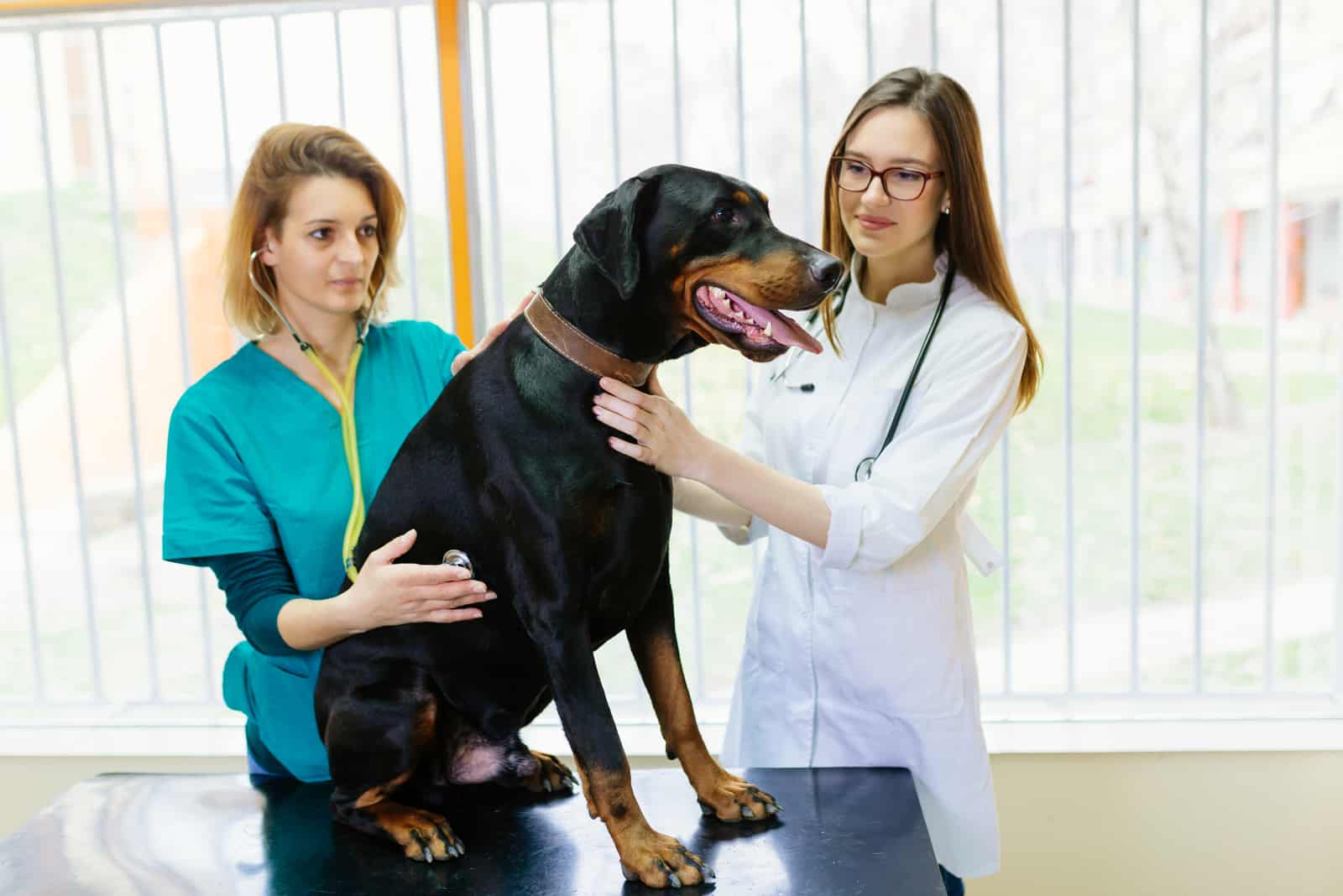
Like all other dog breeds, Doberman Pinschers are prone to developing certain health conditions – the best way to prevent these health issues from arising in the first place is to source your puppy from the best Doberman breeder you can find.
Reputable and reliable dog breeders will make sure to health-test their breeding dogs in order to ensure that they are as healthy as possible before breeding, and that the litters they produce are equally healthy and free of hereditary illnesses.
On the other hand, if you’re the type of person who doesn’t believe in paying for a dog, and you would rather adopt one – you can always check out the best Doberman rescues for adoption.
Adopting a dog is admirable, and it is certainly an option that’s easier on your wallet in the beginning, but it has its downsides – you can never be sure of a dog’s overall health condition, and you might end up spending a lot more money on vet bills.
Here are some common health problems that Dobermans are prone to.
Hip Dysplasia
The most common genetic health problem that occurs in dogs is a musculoskeletal disorder called hip dysplasia – which can easily be kept at bay by feeding your dog high-quality food.
Inflammation and Malnutrition
Many health problems that occur in dogs come from inflammation and malnutrition – the most common of them being a lack of calcium.
However, even though protein is a key nutritional element in a dog’s diet – an overabundance of protein can lead to kidney problems, such as pancreatitis. It’s also a fairly common occurrence in dogs that consume foods that contain a high percentage of fat, or dogs that eat a lot of human food, such as table scraps.
Heart Diseases
Another health problem that’s fairly common in dogs, especially in dogs that consume excessive amounts of salt and fat, is heart disease. These health conditions can either be life-threatening or abruptly shorten your Doberman’s lifespan.
Even dogs that seem perfectly healthy at first glance might gradually develop certain health problems down the line due to obesity or poor nutrition – this is why it’s crucial to properly take care of your Doberman and closely monitor its food intake. You wouldn’t want your dog’s health to be jeopardized by a poor choice of dog food.
Can A Doberman Pinscher Puppy Eat Human Food?
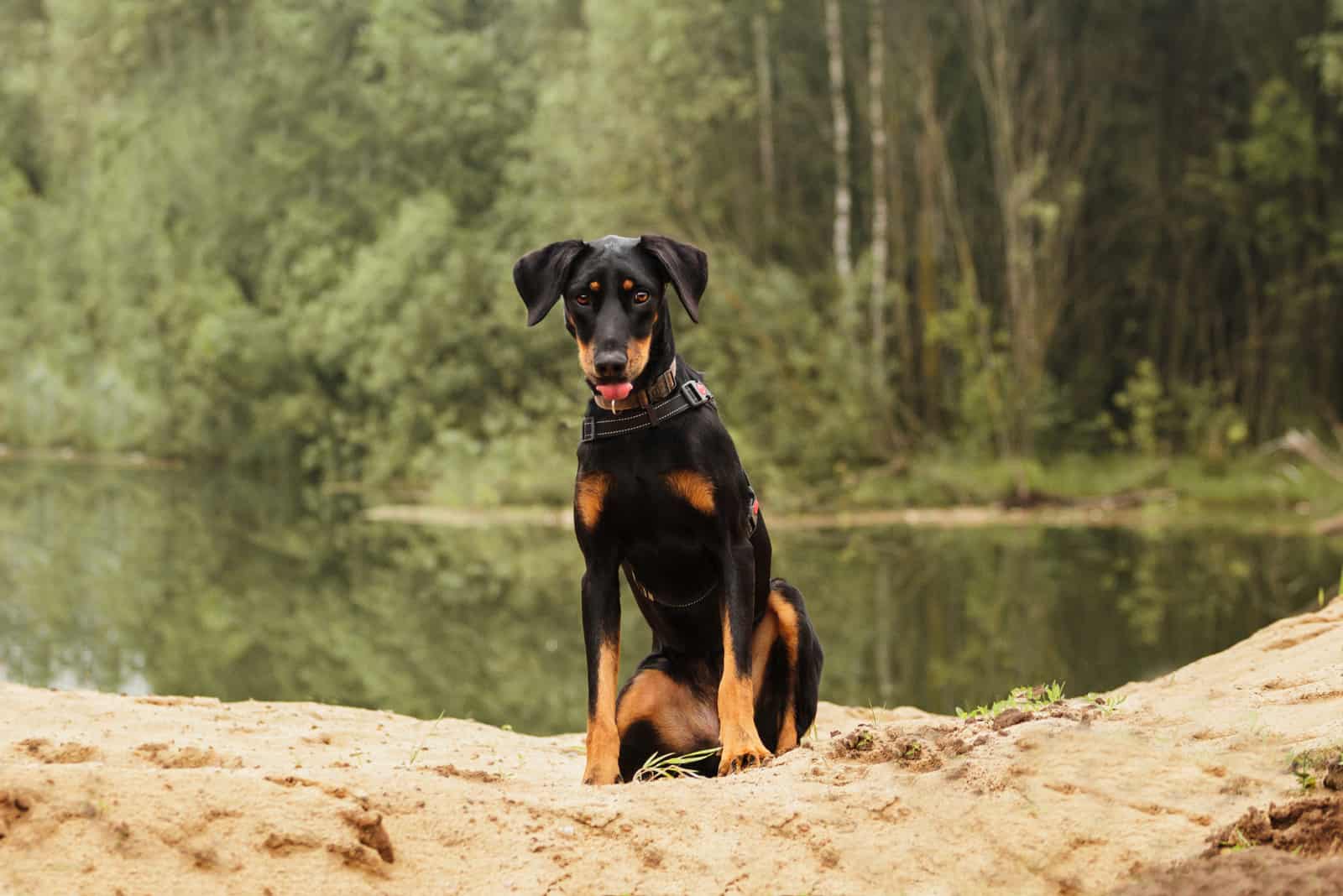
Generally, it’s not a good idea to feed your Doberman puppy human food or any leftover table scraps. Young puppies have very sensitive tummies that can easily become upset, which could lead to diarrhea and dehydration – none of which are a pretty sight.
That said, there are a few healthy options you can turn to if you want to give your dog a treat once in a while – treats that, in fact, are a better alternative to store-bought dog treats.
Foods that are rich in protein, like meats, fruits, and veggies are a good option for a worthwhile snack.
Chicken, beef, fish, turkey, and eggs are excellent sources of protein that can help boost your Doberman puppy’s muscle growth, in addition to certain veggies and fruits that contain lots of vitamins.
Here’s a list of foods that are completely safe for dogs to eat:
| Fruits | Vegetables | Seeds, Nuts, and Grains |
|---|---|---|
| Blueberries | Peppers | Chestnuts |
| Strawberries | Carrots | Brown Rice |
| Apples | Brussels Sprouts | White Rice |
| Watermelons | Cucumbers | Oats |
| Papaya | Peas | Quinoa |
| Bananas | Sweet Potatoes | Rye |
| Coconuts | Celery | Barley |
| Mangos | Cilantro | Flaxseeds |
However, there are certain human foods that are not recommended for dog consumption – some of these foods can make your puppy severely ill, and some of them are entirely poisonous to dogs.
Here’s a list of human foods that should never be fed to dogs:
| Poisonous | Might Cause Intolerance or Allergic Reaction |
|---|---|
| Chocolate | Dairy products |
| Avocado | Beef |
| Raisins | Wheat |
| Macadamia nuts | Soy |
| Fruit pits | Poultry |
| Onions and garlic | |
| Grapes |
Giving Supplements To A Doberman Puppy
While looking for the best dog food to feed your Doberman puppy, you’ll most likely come across lots of dog supplement ads such as vitamin supplements and fatty acid supplements, along with joint health supplements such as glucosamine – it’s easy to think that your dog might need supplementation in its diet, but is this really true?
Your Doberman puppy should be consistently ingesting an optimal amount of minerals and vitamins – without these, a dog’s immune system would be weakened enough to the point where it won’t be able to fight off any illness.
Some of the vitamins and minerals that are crucial for your Doberman’s proper development are the following:
| Vitamins | Minerals |
|---|---|
| Vitamin A | Calcium |
| Vitamin E | Magnesium |
| Vitamin D | Potassium |
| Vitamin K | Phosphorus |
| B- complex vitamins |
Vitamins are great for your Doberman’s skin, coat, and immune system, while minerals are important for bone development, muscle development, the circulatory system, and the nervous system.
That said, just because minerals and vitamins are important for your dog’s adequate growth and development, it doesn’t automatically mean that you should give your dog any kind of supplementation on your own.
In fact, if you give your dog too much of a certain mineral or vitamin, it could lead to serious consequences on its overall health.
Think of it this way: if you’re a contractor who is working on constructing a tall building and I’m the supplier of the materials you need to build it, and I deliver a full year’s worth of materials to the construction site – will that make you build the building faster? The answer is no.
You should never give your dog any supplement before consulting a veterinarian who can give you expert advice on whether your dog needs any additional supplementation in its diet or not.
In Conclusion
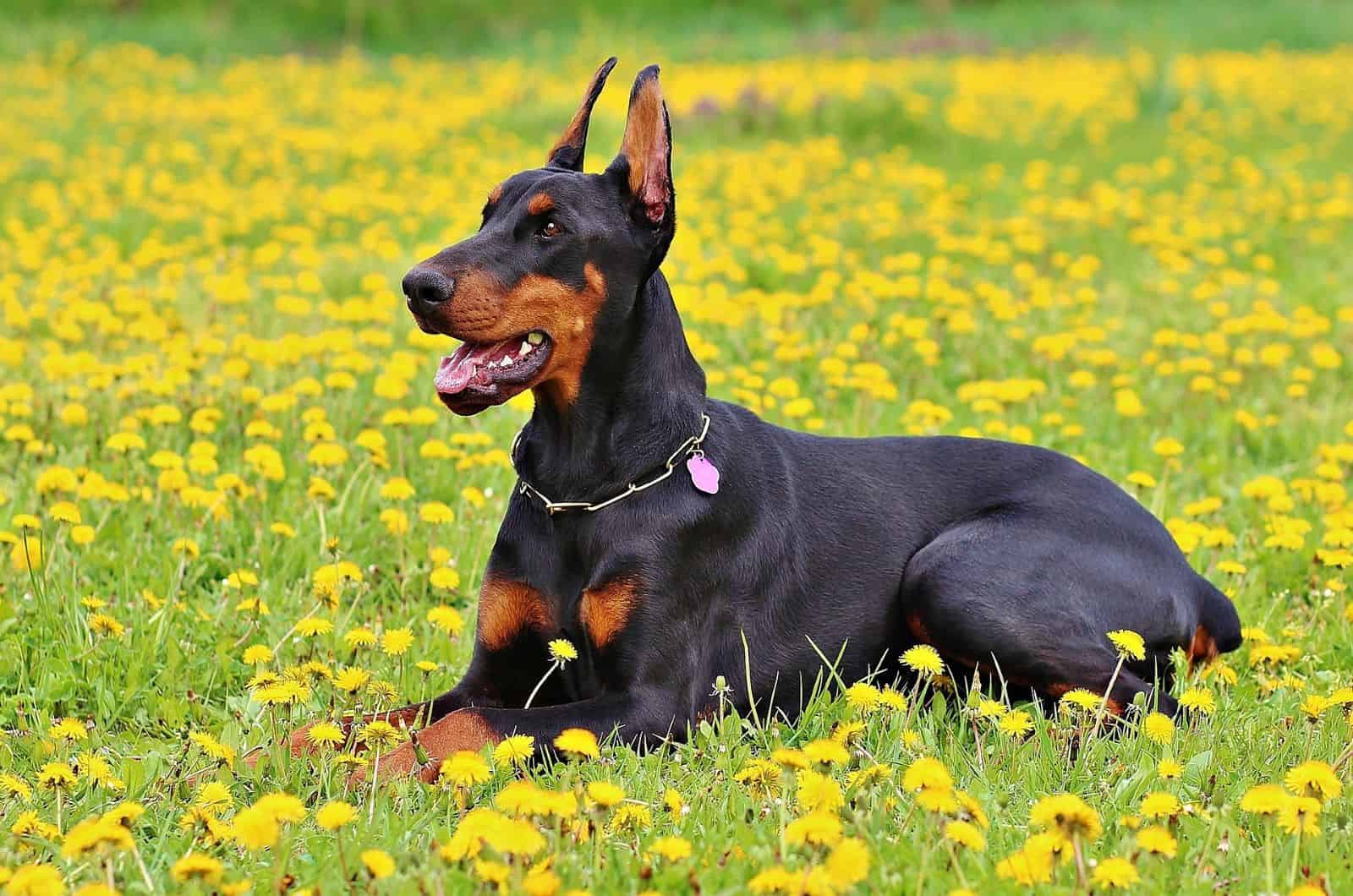
Now that you have this useful Doberman feeding chart at your disposal, it’s important to remind you again that it should only serve as a rule of thumb as opposed to a strict set of rules you need to follow.
When calculating the amount of food your Doberman needs, you need to take into account the many different factors that impact the process such as your puppy’s weight, growth rate, age, and overall health condition.
You should also keep in mind that dogs that are more active need more energy compared to dogs that exercise less – so try to keep your dog well fed throughout the day, especially if it’s exerting itself more than usual.
A balanced diet is key to a growing Doberman puppy’s physical and mental development – if you don’t feed your Doberman adequately, it might end up developing health issues.
And, remember to always consult a veterinarian before changing your dog’s diet since a professional can tell you exactly what needs to be done in order to help keep your dog in optimal health.
Read Next:
• Brown Doberman Color 101: What Do They Look Like?
• 9 Doberman Breeders In Colorado With The Best Reputation

